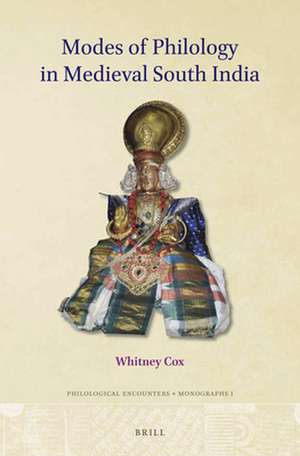Modes of Philology in Medieval South India: Philological Encounters Monographs, cartea 1
Autor Whitney Coxen Limba Engleză Hardback – 12 oct 2016
Arguing that such pseudepigraphical genres as the Sanskrit purāṇas and tantras incorporated modes of philological reading and writing, Cox demonstrates the ways in which the production of these works in turn motivated the invention of new kinds of śāstric scholarship. Combining close textual analysis with wider theoretical concerns, Cox traces this philological transformation in the works of the dramaturgist Śāradātanaya, the celebrated Vaiṣṇava poet-theologian Veṅkaṭanātha, and the maverick Śaiva mystic Maheśvarānanda.
Preț: 546.02 lei
Preț vechi: 665.88 lei
-18% Nou
Puncte Express: 819
Preț estimativ în valută:
104.48€ • 111.73$ • 87.11£
104.48€ • 111.73$ • 87.11£
Carte indisponibilă temporar
Doresc să fiu notificat când acest titlu va fi disponibil:
Se trimite...
Preluare comenzi: 021 569.72.76
Specificații
ISBN-13: 9789004331679
ISBN-10: 9004331670
Dimensiuni: 155 x 235 mm
Greutate: 0.45 kg
Editura: Brill
Colecția Brill
Seria Philological Encounters Monographs
ISBN-10: 9004331670
Dimensiuni: 155 x 235 mm
Greutate: 0.45 kg
Editura: Brill
Colecția Brill
Seria Philological Encounters Monographs
Notă biografică
Whitney Cox, University of Chicago, is Associate Professor in the Department of South Asian Languages and Civilizations at that university and a member of the Collegium of the Zukunftsphilologie research project, Forum Transregionale Studien, Berlin. He is the author of Politics, Kingship and Poetry in Medieval South India: Moonset on Sunrise Mountain (Cambridge, 2016)
Cuprins
Table of Contents
Acknowledgments
A note on the transliteration, presentation, and citation
of primary texts
I. Introduction: towards a history of Indic philology
Philology?
Indian philology?
Existing studies
Parameters
II. Textual Pasts and Futures
The southern pseudepigrapha: an overview
A case study: the Sūtasaṃhitā
Methods of the anonymous philology: the ‘toolkit’
Appropriation and adaptation: Cekkiḻār’s Pĕriyapurāṇam
Conclusions: looking ahead
III. Bearing the Nāṭyaveda: Śāradātanaya’s Bhāvaprakāśana
Introduction: nāṭya as a form of knowledge
At Śāradā’s side: the author and his work
Bharatavṛddha, Śiva, Padmabhū, Vāsuki
‘Following the Kalpavallī’
“Lost or as good as lost”
IV. Veṅkaṭanātha and the limits of philological argument
Snakes versus Eagles
Rite and Contamination
Earlier canons of Vaiṣṇava textual criticism
On the shores of the milk ocean: Veṅkaṭanātha’s poetry as philology
V. Flowers of language: Maheśvarānanda’s Mahārthamañjarī
The dream
The pleasures of the text
Ambiguity and auto-philology
Writing, reading, and the hermeneutical yogin
Maheśvarānanda’s Gītā
VI. Conclusions: philology as politics, philology as science
Context one: philology in and as temple-state politics
Context two: Indic philology and the history of science
1. Non-reductive historicism
2. The refusal of teleology
3. The agency of the non-human
Problems and prospects
Bibliography
Acknowledgments
A note on the transliteration, presentation, and citation
of primary texts
I. Introduction: towards a history of Indic philology
Philology?
Indian philology?
Existing studies
Parameters
II. Textual Pasts and Futures
The southern pseudepigrapha: an overview
A case study: the Sūtasaṃhitā
Methods of the anonymous philology: the ‘toolkit’
Appropriation and adaptation: Cekkiḻār’s Pĕriyapurāṇam
Conclusions: looking ahead
III. Bearing the Nāṭyaveda: Śāradātanaya’s Bhāvaprakāśana
Introduction: nāṭya as a form of knowledge
At Śāradā’s side: the author and his work
Bharatavṛddha, Śiva, Padmabhū, Vāsuki
‘Following the Kalpavallī’
“Lost or as good as lost”
IV. Veṅkaṭanātha and the limits of philological argument
Snakes versus Eagles
Rite and Contamination
Earlier canons of Vaiṣṇava textual criticism
On the shores of the milk ocean: Veṅkaṭanātha’s poetry as philology
V. Flowers of language: Maheśvarānanda’s Mahārthamañjarī
The dream
The pleasures of the text
Ambiguity and auto-philology
Writing, reading, and the hermeneutical yogin
Maheśvarānanda’s Gītā
VI. Conclusions: philology as politics, philology as science
Context one: philology in and as temple-state politics
Context two: Indic philology and the history of science
1. Non-reductive historicism
2. The refusal of teleology
3. The agency of the non-human
Problems and prospects
Bibliography



